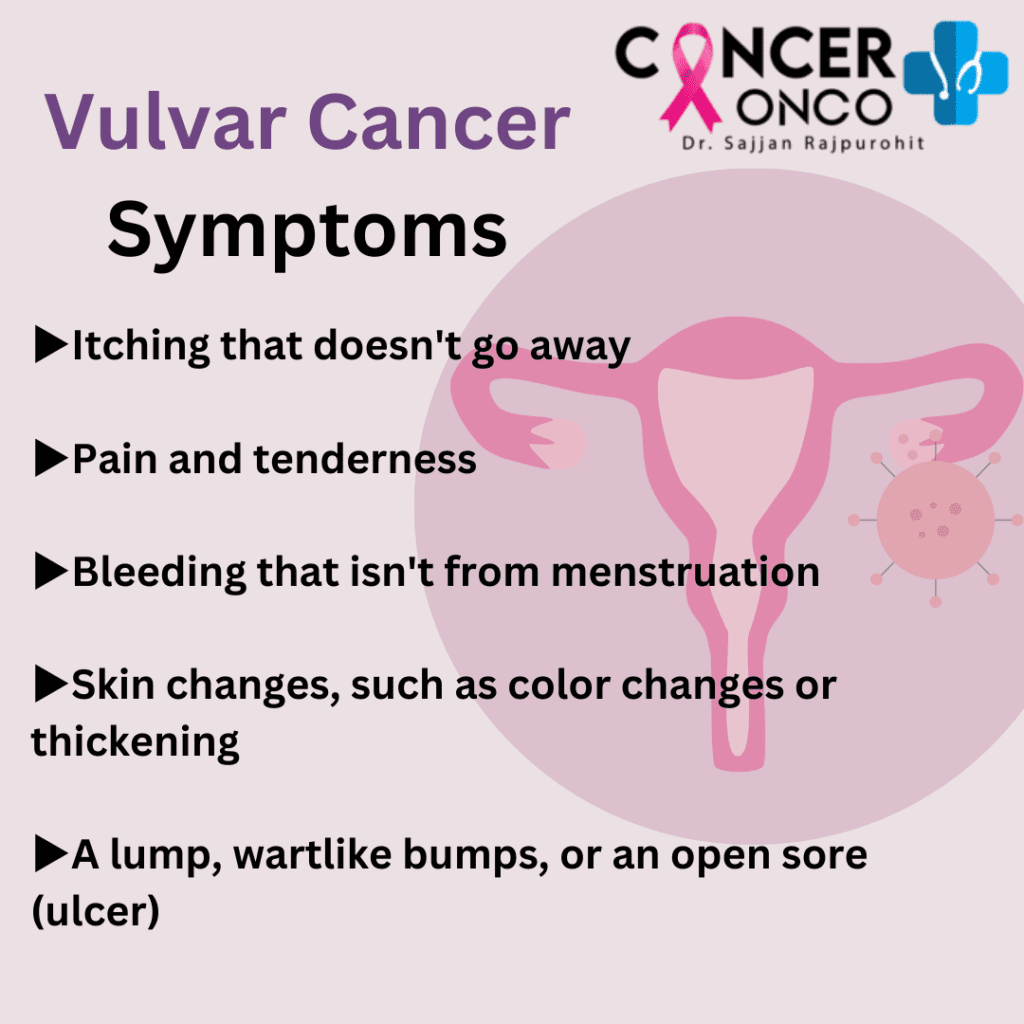Vulvar cancer, though relatively rare, requires attention due to its impact on women’s health. Understanding its symptoms, causes, and available treatment options is crucial for its early detection and effective management.
Introduction to Vulvar Cancer
Vulvar cancer is a type of cancer that occurs on the outer surface area of the female genitalia. The vulva is the area of skin that surrounds the urethra and vagina, including the clitoris and labia.
Vulvar cancer commonly forms as a lump or sore on the vulva that often causes itching. Though it can occur at any age, vulvar cancer is most commonly diagnosed in older adults.
Vulvar cancer treatment usually involves surgery to remove the cancer and a small amount of surrounding healthy tissue. Sometimes vulvar cancer surgery requires removing the entire vulva. The earlier vulvar cancer is diagnosed, the less likely it is that extensive surgery is needed for treatment.
Understanding the Symptoms

Signs and symptoms of vulvar cancer may include:
- Itching that doesn’t go away
- Pain and tenderness
- Bleeding that isn’t from menstruation
- Skin changes, such as color changes or thickening
- A lump, wartlike bumps, or an open sore (ulcer)
Understanding the Causes
Risk Factors Associated
Several risk factors contribute to vulvar cancer, including HPV infection, smoking, a weakened immune system, and a history of precancerous conditions or skin conditions affecting the vulva.
HPV and Other Factors
Human Papillomavirus (HPV) infection is a key risk factor. However, not all HPV infections lead to vulvar cancer. Other factors, such as age, skin conditions, and lifestyle habits, can also play a role.
Diagnosis and Screening Methods
Medical Consultation Importance
Prompt consultation with a healthcare professional upon noticing symptoms is crucial. A gynecologist or specialist can perform a thorough examination and recommend further tests if necessary.
Screening Procedures
Tests might include a biopsy, imaging scans, and pelvic examinations, which aid in the accurate diagnosis and staging of the cancer.
Treatment Options Available
▶ Surgical Treatment
1. Minimally Invasive Surgery
Minimally invasive procedures offer a less invasive approach to treating vulvar cancer, reducing recovery times and discomfort. Patients may consider laparoscopic or robotic-assisted surgery for targeted and precise interventions.
▶Consultation with Specialists: Initiate the process with a surgical oncologist to determine eligibility for minimally invasive procedures.
▶Understanding the Benefits: Learn about the advantages of minimally invasive surgery, such as shorter hospital stays and quicker recovery.
▶ Traditional Surgery
In some cases, traditional surgical methods remain essential. This involves the removal of cancerous tissue through more conventional procedures.
1. Surgical Consultation: Schedule a consultation to discuss the extent of surgery required and potential outcomes.
2. Postoperative Care: Prepare for recovery by understanding postoperative care instructions and follow-up appointments.
▶ Radiation and Chemotherapy
Radiation therapy employs high-energy rays to target and destroy cancer cells. It can be used as a primary treatment or in conjunction with surgery.
▶ Immunotherapy and Targeted Therapy
Advancements in medical science have introduced immunotherapy and targeted therapy as potential treatments, focusing on specific cancer cells while sparing healthy tissues.
▶ Palliative Care
Palliative care focuses on improving the quality of life for individuals with vulvar cancer, addressing symptoms, and providing emotional support.
1. Early Integration: Consider integrating palliative care early in the treatment process for comprehensive support.
2. Communication with the Care Team: Maintain open communication with healthcare providers to address changing needs and preferences.
Conclusion
Understanding the symptoms, causes, and options for the best vulvar cancer treatment in Delhi is crucial for early detection and effective management. Seeking specialized care and staying proactive in health check-ups can significantly impact the treatment outcome.
What are the primary symptoms of vulvar cancer?
Symptoms may include persistent itching, pain, unusual growths, and abnormal bleeding.
How is vulvar cancer diagnosed?
Diagnosis involves pelvic examinations, biopsies, and imaging tests recommended by a healthcare professional.
What are the common treatment options available?
Treatments include surgery, radiation, chemotherapy, immunotherapy, and targeted therapy.
Why is specialized care important in vulvar cancer treatment?
Specialized care ensures tailored treatment plans and expert guidance for better outcomes.
What follow-up care is necessary post-treatment?
Regular follow-ups are essential for monitoring recovery and detecting any signs of recurrence.



